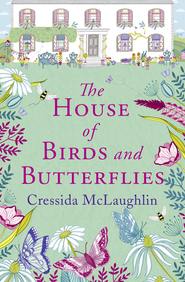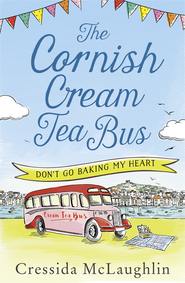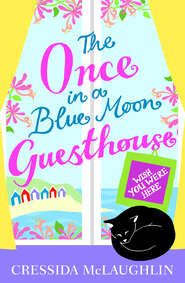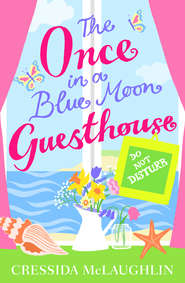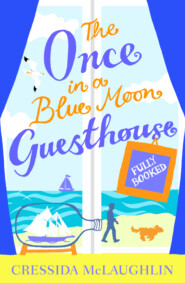По всем вопросам обращайтесь на: info@litportal.ru
(©) 2003-2025.
✖
The Once in a Blue Moon Guesthouse: The perfect feelgood romance
Автор
Год написания книги
2018
Настройки чтения
Размер шрифта
Высота строк
Поля
‘Lunch?’ she asked.
Molly rubbed her stomach. ‘If you’re offering, otherwise some of these Sharpies might mysteriously disappear.’
‘Make yourself comfortable downstairs and I’ll bring in some sandwiches.’
Robin boiled eggs, fried rashers of streaky bacon and brewed Lapsang Souchong in one of the ruby-red breakfast teapots. As she did, she found her thoughts turning unavoidably to Tim.
Tim Lewis had been her childhood sweetheart. The most irritating, prank-playing, arrogant little shit at school who, somewhere between the ages of twelve and fourteen, had become utterly desirable. He had still played the odd prank, but his ridiculous blond curls were tamed, and his arrogance had honed itself into a confidence and determination that he was going to do something with his life.
Robin had, like all the other girls, harboured a not-very secret crush on him, and was more surprised than anyone else in the school – though only by a small margin – when, on a balmy September day, aged fourteen, he had asked her out. She had never been a wallflower at school, but she hadn’t reached the heights of popularity that put her automatically within his reach, either. He’d seemed over-confident when he’d asked, accidentally spilling the can of Coke he was holding nonchalantly in his hand, and Robin liked him all the more for that. They’d travelled on the bus to Bridport cinema and watched There’sSomethingAboutMary, nervous at having got in a year too young. Towards the end of the film, Tim had slipped his hand in hers.
They’d dated, declaring each other boyfriend and girlfriend, their relationship surviving against the odds right up until Robin went to London to study Sociology. They’d thought they could make it work; Robin had harboured ideas of Tim coming to join her in the capital – she was sure his ambition would outgrow their cosy Dorset town – but she had misjudged him. Tim was happy where he was, staying close to his family and being a big fish in a small pond, working for a local estate agent, graduating from first homes and small flats to manage country estate sales. Now, it seemed, he’d progressed even further.
Robin poured out the boiling water and ran the eggs under the cold tap, the smell of sizzling bacon filling the kitchen. Of course she’d thought about Tim when she’d made the decision to return to Campion Bay, but they hadn’t spoken for over ten years. They were both in their early thirties now. Molly had kept her updated with significant news while she was in London, and so as far as she knew he wasn’t married, but did he still leave his hair that bit too long, allowing those gorgeous blond curls to flourish? Robin bit her lip. It was only a matter of time before they bumped into each other.
There had been something magnetic about his confidence, something altogether irresistible. It was the thing that made her heart beat faster now, so many years later, and even after the way it had ended. The problem was that Tim knew how irresistible he was, and over time the kindness and warmth that he’d directed at her had begun to fade, especially once Robin had moved away and their relationship had become more like hard work. Maybe she hadn’t been there often enough, telling him she loved him, keeping his ego inflated. Whatever it was, he’d eventually found comfort and adoration with someone else, and had admitted it to Robin during an argument weeks later, as if wanting her to know what she was missing out on.
And yet the thought of seeing him again left her feeling more than just unease. There was anticipation there too, which she was trying to put down to simple curiosity. Robin found she was bashing the eggs into submission, her chunky mayonnaise becoming more of a purée. She scooped the filling into two rolls, emptied packets of Kettle crisps on to the plates and took them through to where Molly was waiting on one of the sofas facing the sea view.
This room, she had already decided, would be called Sea Shanty. The upright piano, its keys remaining dusty for years, sat in one corner, and Robin had plans to distress the long wooden table that ran down the room’s centre, buy a tea-chest coffee table and antique globe, and soften the room by replacing the teal wallpaper with ivory and adding navy and red rugs, curtains and sofa cushions.
She sat down, her breathing slowly returning to normal. Thinking about the guesthouse was becoming a balm to other, more troubling imaginings, somewhere comforting she could turn to when thoughts of Tim, or memories of Neve, tried to take over. But, it seemed, Molly wasn’t prepared to let the subject lie.
‘Something else I should tell you about when I saw Tim,’ she said slowly, scooping up some stray mayonnaise with her finger.
‘What?’ Robin asked, a little too sharply. ‘Sorry, what else? Was he with someone we know?’
‘Uh uh.’ Molly shook her head. ‘I didn’t speak to them, but I might have scooted close to their table on a couple of occasions, and I heard them mention Goldcrest Road. Specifically number four.’
Robin swallowed too quickly and started coughing.
‘Shit, Robin!’ Molly slapped her vigorously on the back until the coughing had subsided and Robin’s shoulder blades were throbbing. ‘I should have waited until you’d finished eating.’
‘They want to buy Tabitha’s house?’
‘I didn’t hear enough of their conversation – I could only pretend to be interested in last year’s New Year’s Eve menu for so long. But they definitely mentioned next door.’
‘Do they want to develop it?’ Robin asked. ‘What’s it like inside, is it sellable?’
‘No idea,’ Molly mumbled through a mouthful of crisps. ‘But Malcolm and Tim are moving on from straightforward sales these days – except for “high end” properties.’ She accompanied the last words with quote-mark fingers. ‘They’re all about the developments. Replacing the old with the new, smartening up the area, as if Campion Bay needs to be turned into a sea of luxury high-rise apartment blocks. No beach finds in their properties, and I expect the word “guesthouse” would be laughed at for sounding too quaint.’
‘Well,’ Robin said, ‘they can’t do that with Tabitha’s house. It’s got special status.’
‘The Jane Austen plaque?’
Robin narrowed her eyes. ‘I will fight you to the ends of the earth on this point, Molly. Ends. Of. The. Earth.’
‘Tabitha was eccentric,’ Molly said, in a tone that reminded Robin she’d said it all before. ‘She put it up there herself. I’ve always thought that, even though she denied it.’
‘No,’ Robin shook her head. ‘Tabitha was just lonely; she lived on her own in that huge house, and she liked to know what was happening with the neighbours and sometimes, sometimes, she would embellish the stories she told us, but that doesn’t mean she made this up. It’s a good quality plaque!’
‘Any sign-maker could copy it – you can probably buy them on gift websites and create your own slogan. And there’s no evidence that Jane Austen wrote a book here.’
‘A lot of Persuasion is set in Lyme Regis! It’s a few miles down the road. It’s so plausible and it’s been there for years, since before online gift shops existed.’
Molly turned her gaze towards the window. ‘Honestly, if that plaque being genuine meant the difference between number four staying as it is and Tim and Malcolm getting their hands on it, I’d swap sides. She was a laugh though, wasn’t she, Tabitha?’
Robin grinned. ‘She was amazing. I’m just sorry I lost touch with her when I went to London. I should have made more of an effort to visit her when I came back to see Mum and Dad. And now her house has been empty for nearly a year and, if what you heard is anything to go by, it’s about to be gobbled up and turned into posh flats that are only lived in for two months out of twelve, just to fill Tim Lewis’s pockets.’
‘See if you can borrow an extra million off your folks and double the size of the guesthouse.’
Robin rolled her eyes and polished off her sandwich. That idea was obviously well beyond her means, but maybe there was some other way she could prevent next door from falling into the hands of the developers. It had been years since she’d been inside Tabitha’s house, but as a child she’d spent hours there, playing Monopoly and Gin Rummy and being introduced to Tabitha’s strange taste in tea. She’d been devastated when she’d heard the old woman had died, but it had been too close to Neve’s death for her to fully absorb it.
It was only now that she was back in Campion Bay that she’d been reminded of the time she spent with her, wondering if the figurines she’d had, the sheep collection that, as an eight-year-old, Robin had adored, were still in the cabinet in the dining room, the glass front keeping out years of dust. She wondered what the house would look like to her adult eyes. Maybe if Tim did get his hands on the property – or the front door keys at least – and Robin plucked up the courage to see him again, he’d let her have one last look before he wiped out the original features in a fit of magnolia paint and stainless steel.
Campion Bay town centre, a twenty-minute walk from the guesthouse, was a mixture of chain stores, quaint seaside gift shops and independent cafés. Bunting was strung up along the brick weave, pedestrianized Seagull Street all year round, the pink, orange and blue fabric flapping enthusiastically in the January wind, and the warm glow of shop interiors beckoned Robin in out of the cold.
She pulled her large jute bag further up her shoulder and pushed open the door of Seagull Street Gallery, the bell giving an appealing ‘ding’ as she stepped inside. The gallery owner, a grey-haired man in his fifties with rimless glasses and a round, pleasant face, looked up from a desk in the corner and nodded her a greeting. She returned it and began a slow tour of the room. It had white walls and polished pine floorboards, each painting given its own space.
In London, when she and Neve had gone on fact-finding missions, or after an initial meeting with a client, Neve would often take Robin into the National Gallery, dragging her by the arm to look at the latest exhibition and always, without fail, the room that housed Turner’s seascapes: TheFightingTemeraire and TheEveningStar. Her friend could stand in front of them for hours, absorbing them, though she’d usually limit it to ten minutes in deference to Robin’s waning interest.
Buying one of the Turners was about a hundred times less plausible than Robin being able to purchase Tabitha’s house in an act of preservation, but she had the idea that one of the bedrooms in the new guesthouse would celebrate the work of local artists, with seascapes and portraits on the walls, the understated furniture giving it the feel of a mini gallery.
Her boots echoed on the floor and she stilled her movements, walking almost on tiptoe as she looked at the paintings; vibrant still-life acrylics in chunky frames; oil portraits with bold brush marks and, as she’d been hoping for, a wide array of seascapes. She stood in front of a large painting of the sea at dawn. The sky was burnished with golden streaks against the first, pale beginnings of blue, the water a dark turmoil beneath and a single smudge of colour on the horizon that, despite its lack of detail, was undoubtedly a boat. It was mesmerizing, an image to be stared at for hours. Robin felt her throat tighten, closed her eyes and willed Neve to be standing alongside her, to whisper to her all the reasons why she liked it.
When Robin opened them again, tears had squeezed themselves into the corners of her eyes and it was the gallery owner who was standing next to her. She hadn’t heard him approach.
‘Oh!’ Robin jolted and wiped at her eyes. ‘Sorry, I didn’t see you there.’
‘Spectacular, isn’t it? A new artist, Arthur Durrant. This is the only one we have of his at the moment, though we’ve more on commission. It’s a special introductory price.’
Robin nodded. It wasn’t cheap, but if it was the centrepiece of the room, on the wall facing the bed, then she could make it work within budget. ‘It’s beautiful,’ she managed, her voice croaky. ‘If I pay for it now, can I bring my car down later to collect it? I’m not sure it’ll fit in here.’ She gestured at the jute bag and smiled.
‘Of course. We’ll package it up for you when you’re ready to pick it up.’ He remained quiet, his movements small, but she could see the gleam in his eye – whether at a large sale or someone else appreciating the art that he loved, she couldn’t tell.
She stepped outside and took a deep breath, which turned into embarrassed laughter. She took the bag off her shoulder and swung it as she walked. Did she really think she could buy a few original paintings and pop them in a shopping bag? Shaking her head at her own ridiculousness, and distracted by an orb lamp glowing at her from its matt silver stand in a shop window, she wasn’t looking where she was going.
‘Whoa,’ said a familiar voice, and Robin turned just in time to see an overcoat-clad man take a quick sideways step.
‘Sorry, I—’ she stopped as the breath left her in a single exhalation. Overcoat man had a crop of blond curls, very blue eyes and, as their gazes met, a winning smile. ‘Tim?’ He didn’t belong in her reverie about Neve and paintings and the guesthouse. He belonged in a different part of her thoughts altogether – one that she was trying not to visit too often.
‘Robin Brennan. I was wondering how long it would take for us to bump into each other, though I hadn’t expected it to be quite so literal.’
His hand was on her arm, and he applied gentle pressure. For a horrifying moment she thought that he was going to hug her, but instead he leaned down and kissed her cheek. His skin was smooth, as always – he’d never sported even a hint of designer stubble in the time she’d known him – and she could tell that his overcoat, and what she could see of the suit beneath, was expensive. She had to admit that, despite the years that had passed without her seeing him, he looked as good as ever.
‘You look well,’ she managed. ‘Things are – OK?’
‘They’re great. Really good.’ He was appraising her unashamedly, his blue eyes taking her in, which she supposed was only fair as she was doing the same to him. ‘It sounds like you’re heading in a new direction, too. Back from London for good, and taking over your parents’ guesthouse?’






